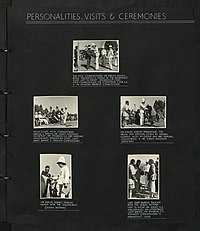Sobhuza II of Swaziland
Sobhuza II of Swaziland (Zombodze, July 22, 1899-Mbabane, August 21, 1982) was King and Supreme Leader of Swaziland from his accession to the throne in 1899 until his death, in 1982. His reign formally began in 1921, as his paternal grandmother, Labotsibeni Mdluli, was Queen Regent between 1899 and 1921, while Sobhuza was coming of age. He is the longest reigning monarch on record, as he was over 82 years old.
Sobhuza won the independence of Swaziland from the United Kingdom (September 6, 1968). When the Kingdom gained independence, it was hoped that the existing tribal governments could be transformed into a constitutional monarchy. This was achieved for some time, until April 12, 1973, when Sobhuza staged a coup, abolishing the Constitution and dissolving Parliament, making him the absolute ruler of the nation.
Biography
Ingwenyama Sobhuza was born in Zombodze on July 22, 1899. [4] He ascended the throne upon the death of his father, Ngwane V as King of Swaziland on December 10, 1899, when he was only four months old. [5] He was educated at the Swazi National School, Zombodze, and at the Lovedale Institution in the Eastern Cape of South Africa before assuming the throne of Swaziland as paramount chief at the age of twenty-two. [4] His grandmother, Labotsibeni Mdluli served as regent during his youth, formally transferring power to Ngwenyama on December 22, 1921. [5] Before assuming royal duties from him, he studied anthropology in England..
Reign
Sobhuza's direct reign would last for more than 60 years (1921-1982), during which he presided over Swaziland's independence from the United Kingdom in 1968, after which the British government recognized him as King of Swaziland (Eswatini). [5] Early in his reign, Sobhuza sought to address the problem of land partition and deprivation instituted by the British authorities in 1907. He did so by first leading a delegation to London to meet King George V and ask him to restore the lands. land. to the Swazi people. [7] He retook his case over the land question in 1929 to the Judicial Committee of the Privy Council. He was defeated by the terms of the Foreign Jurisdictions Act of 1890 which effectively placed the actions of British administrations in protectorates beyond the reach of British courts. [4] Sobhuza's role during this colonial period was largely ceremonial, but he still held great influence as the traditional leader of the Swazi nation. [4] In 1934, he was received by the anthropologist Bronislaw Malinowski. In 1953 he attended the coronation of Queen Elizabeth II in London. [8]
In the early 1960s, Sobhuza played a major role in the events that led to his country's independence in 1968. He opposed the British government's proposed post-colonial Westminster constitution, in which he was assigned the role of constitutional monarch. [4] As a consequence, acting through his advisory council, he formed the Imbokodvo National Movement, a political party, which contested and won all the seats in the 1967 pre-independence elections. [4] He was recognized by the British as king of Swaziland.in 1967 when Swaziland received direct rule. Independence was achieved on September 6, 1968. After this, Sobhuza skillfully combined the lure of tribal customs with the ability to manage economic and social change in his kingdom. [4] On April 12, 1973, the king abrogated the constitution and dissolved parliament, henceforth exercising power as absolute ruler. [5] In 1978 a new constitution was promulgated which provided for an elaborate reversion to a tribal mode of government involving an electoral college of eighty members elected by forty local councils known as tinkhundla, dominated by tribal elements. Swaziland's economy prospered under Sobhuza's leadership. Swaziland is rich in natural resources, and much of the land and mineral wealth that originally belonged to non-Swazi interests came under indigenous control during Sobhuza's reign. [4]
Marriage and offspring
King Sobhuza continued the tribal practice of having multiple wives. According to the Swaziland National Trust Commission, "King Sobhuza II had 70 wives, who bore him 210 children between 1920 and 1970." Many of them are alive today.
Death
He died of pneumonia in 1982 and was succeeded by his young son Mswati III, after a period of regency by Queen Dzeliwe and Queen Ntombi.
Honorary Distinctions
Swazi Honorary Awards
Foreign Honorary Distinctions
 Honorary Officer of the Order of the British Empire, Civil Division (OBE) (United Kingdom, 11/05/1937).
Honorary Officer of the Order of the British Empire, Civil Division (OBE) (United Kingdom, 11/05/1937). Honorary Commander of the Order of the British Empire, Civil Division (CBE) (United Kingdom, 08/06/1950).
Honorary Commander of the Order of the British Empire, Civil Division (CBE) (United Kingdom, 08/06/1950). Commander of the Order of the British Empire, Civil Division (KBE) (United Kingdom, 01/01/1966).
Commander of the Order of the British Empire, Civil Division (KBE) (United Kingdom, 01/01/1966). Supreme Companion of the Order of Companions of O. R. Tambo [on a posthumous title] (Republic of South Africa, 20/04/2006).
Supreme Companion of the Order of Companions of O. R. Tambo [on a posthumous title] (Republic of South Africa, 20/04/2006).
Titles and treatments
- 22 July 1899-10 December 1899: His royal highness the prince heir to Swaziland.
- 10 December 1899-21 August 1982: His Majesty the king of Swaziland.
Succession line
<br Clear;
Contenido relacionado
Mobutu Sese Seko
Antonio de Guill y Gonzaga
Franz von papen
Manuel Maria de Llano
Raul Alfonsin

